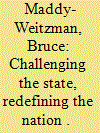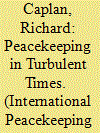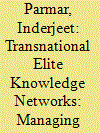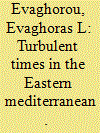|
|
|
Sort Order |
|
|
|
Items / Page
|
|
|
|
|
|
|
| Srl | Item |
| 1 |
ID:
156284


|
|
|
|
|
| Summary/Abstract |
This article examines the efforts of the Amazigh (Berber) identity movement during the last 7 years to redefine the content of North African states’ collective national identities, and the responses of state and other societal actors during a period of renewed political contestation. In highlighting the increasingly charged and contested political environment in North Africa, it argues that (a) the Berber-Amazigh identity movement has registered important symbolic achievements, (b) translating these symbolic achievements into concrete ones remains enormously difficult, and (c) the discourse and praxis of the Amazigh current has become increasingly militant, and even ethnonational.
|
|
|
|
|
|
|
|
|
|
|
|
|
|
|
|
| 2 |
ID:
169235


|
|
|
| 3 |
ID:
168924


|
|
|
|
|
| Summary/Abstract |
The liberal international order’s own theory is as much in crisis as the institutional system whose virtues it champions. This is due first to theoretical shortcomings per se, and due second to its misunderstanding or neglect of the role of elite knowledge networks and of socialization in the development and perpetuation of American liberal hegemony. This article, which adds to recent interest in the dynamics of hegemonic-order building and maintenance, argues that a neo–Gramscian-Kautskyian theoretical synthesis better explains the character and methods of the liberal international order. The article considers two cases through which to compare liberal-internationalist and Gramscian-Kautskyian claims: the 1970s challenge of third-world states under the banner of a new international economic order (NIEO) and the managed opening of China, and the Trumpian challenge to the liberal international order. On that basis, the article concludes that the hegemonic liberal international order and its core states and elite networks are engaged in a titanic struggle against forces unleashed by a combination of its own successes, inadequacies, and exclusions. Gramscian-Kautskyian theory, using the transnationally extended “elite knowledge network” concept, also suggests that, despite turbulence, the hegemonic liberal international order has significant powers of adaptation, co-optation, and resistance, and is likely to remain resilient, if turbulent and not unchanged, for the foreseeable future.
|
|
|
|
|
|
|
|
|
|
|
|
|
|
|
|
| 4 |
ID:
160299


|
|
|
|
|
| Summary/Abstract |
In recent years, the eastern Mediterranean has been characterized by instability and intense competition among states and nonstate actors. This is mainly because of the Syrian crisis, the terrorist activity of the Islamic State in Syria, the competition over energy sources, the tensions in Turkey-Israel relations, and the unresolved Cyprus problem. In an attempt to analyze and explain these reasons, the essay concludes with assumptions on how stability and security in the eastern Mediterranean might emerge. This analysis, based on the theoretical background of political realism as a theory of international relations, focuses on the strategy of states involved in the regional developments, as well as on the effects of other nonstate actors.
|
|
|
|
|
|
|
|
|
|
|
|
|
|
|
|
|
|
|
|
|